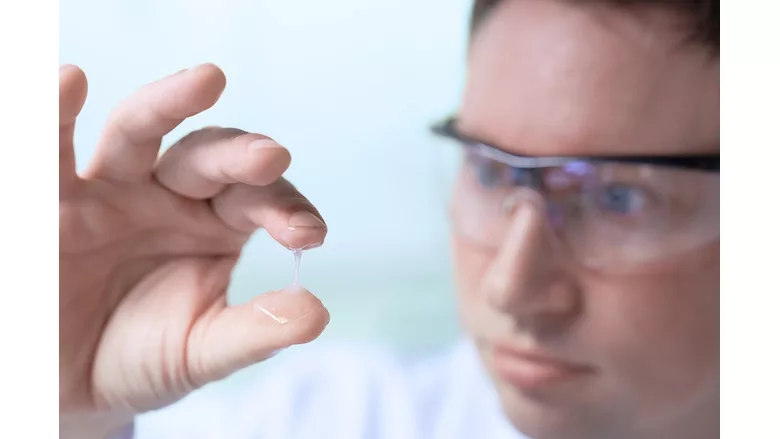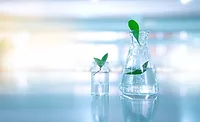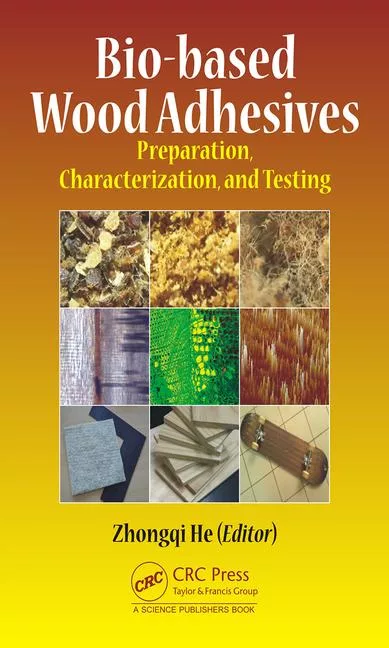Scientists Study Bio-Based Adhesives for Industrial Applications

Bio-based adhesives can replace dispersion adhesives made of synthetic polymers, for example in the production of packaging. © Fraunhofer IAP, Andrea Schneidewendt
Folding cartons are considered sustainable packaging solutions for numerous everyday products – whether breakfast cereals, electronic goods, medicines, or perfume. Made of paper and cardboard, folding boxes save resources when produced and are biodegradable and easy to recycle. However, there remain challenges in producing environmentally friendly adhesives. Researchers at the Fraunhofer Institute for Applied Polymer Research IAP are developing and testing bio-based adhesives for the industrial production of folding cartons in the Sustainable Gluing with Renewable Adhesives SUGRA project.
Dispersion adhesives made of synthetic polymers have so far been the main solution for the industrial production of folding cartons on high-speed production machines. The disadvantage of these adhesives is they consist mainly of fossil raw materials. Researchers at Fraunhofer IAP want to change that. Together with partners from industry and science, they are working on bio-based adhesives made from renewable raw materials.
From the Laboratory to Industry
Adhesives for folding cartons meet high requirements. "The application quality, the setting time and the initial adhesive strength, the so-called initial stack, are important factors for the successful production of folding cartons on high-speed production machines," explained Dr. Jens Buller, head of the Starch Modification / Molecular Properties department at Fraunhofer IAP. Modern folder-gluers reach production speeds of up to 600 meters per minute. This leaves only a few seconds to create a stable adhesive bond. The small adhesive tabs in folding cartons also require particularly precise adhesive application. The glue must not splash, drip, or pull strings. If it gets into areas that should remain adhesive-free, internal adhesions can occur, which make it impossible to erect the packaging and thus use it.
Replacing Synthetic Polymers
Buller explained further, "Even the choice of raw material has an effect on the properties of the adhesive. For example, it has a significant influence on whether the adhesive forms threads." The team at Fraunhofer IAP has characterized, analyzed, and evaluated modified starch products to determine the suitable raw material. The researchers achieve the high initial stack, the short setting time, and the necessary flow and application behavior of the adhesive for the industrial production of folding cartons by further modifying the thickness and formulating it into starch adhesives. During development, the scientists ensure that the adhesive is food compliant.
Successfully Testing Bio-Based Adhesives
The application quality of the bio-based adhesive variants has already been successfully tested in cooperation with industrial companies on high-speed machines with nozzle application. In addition, the high initial adhesion and stability of the adhesive seam at high humidity and temperature could be demonstrated. The researchers are taking a holistic approach to developing the adhesive: Together with their partners Baumer hhs GmbH, PTS – Institute for Fibers & Paper gGmbH and the Fraunhofer Institute for Surface Engineering and Thin Films IST, they are looking at the interaction of the starch adhesive with the equipment, conditions, and environment of folding carton production. "Our results show that bio-based starch adhesives are suitable for replacing synthetic polymers in folding carton production. In addition, they can significantly simplify recycling processes due to their good solubility. We are thus paving the way for holistically environmentally friendly and sustainable packaging," said Buller.
Learn more about the Fraunhofer Institute for Applied Polymer Research IAP at www.iap.fraunhofer.de/.
Looking for a reprint of this article?
From high-res PDFs to custom plaques, order your copy today!






